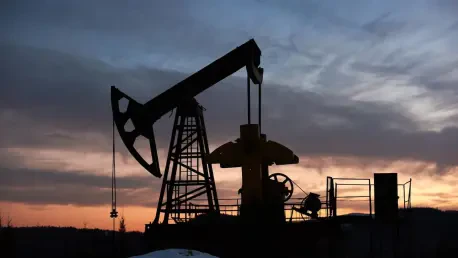In today’s rapidly evolving geopolitical landscape, Christopher Hailstone brings invaluable insight into the EU’s recent 18th sanctions package against Russia. With his extensive experience in energy management and renewable energy, Christopher provides a deep understanding of the implications these sanctions hold for Russia’s energy sector, the intricacies behind financial restrictions, and the broader impact on regional stability.
What is the main focus of the EU’s 18th sanctions package against Russia?
The EU’s latest sanctions package primarily targets Russia’s energy revenues and banking sector, aiming to undermine Moscow’s financial strength and military industry. The focus is on restricting financial transactions and imposing a price cap on Russian crude oil to weaken its economic capabilities.
How does the proposed sanctions package aim to impact Russia’s energy sector?
By proposing a ban on transactions related to the Nord Stream pipelines and lowering the G7 oil price cap, the sanctions intend to diminish Russian energy export revenues significantly. The goal is to hinder Russia’s ability to finance its continued aggression against Ukraine.
Can you elaborate on the impact the sanctions will have on Russian banks?
The sanctions propose a full transaction ban on 22 additional Russian banks, which would go beyond previous restrictions like removal from SWIFT. This aims to further isolate Russia’s financial system, making it challenging for these banks to engage in international transactions and circumvent existing sanctions.
What are the specific banks the EU plans to target with a full transaction ban?
The package includes proposals targeting banks integral to sanctions evasion activities, although specific names aren’t publicly stated yet. The intention is to affect banks deeply embedded in international dealings and those aiding in bypassing EU financial restrictions.
How do these sanctions on banks relate to previous restrictions, such as removal from SWIFT?
While removal from SWIFT cut off crucial communication channels, these new sanctions escalate the situation by fully banning transactions, aiming for more direct financial isolation and limiting the banks’ operational capabilities on the global stage.
What is the rationale behind expanding the scope to include banks from third countries?
Expanding to third-country banks prevents avenues for Russia to reroute transactions and bypass sanctions indirectly. It strengthens the EU’s financial embargo by anticipating potential loopholes that Russia might exploit through its international networks.
Why was the Russian Direct Investment Fund (RDIF) included in this proposal?
The RDIF’s inclusion is due to its significant role in fostering economic ties which could underpin Russia’s military endeavors. By targeting RDIF and its subsidiaries, the EU seeks to stifle investments that might bolster Russia’s war capacity under the guise of international relations.
How does Kirill Dmitriev view the EU’s sanctions against the RDIF?
Dmitriev perceives the sanctions as the EU’s attempt to prolong the conflict, criticizing them for disrupting RDIF’s role in restoring international relations, particularly with European entities operating in Russia.
What changes has the EU proposed regarding the G7 oil price cap on Russian crude oil?
The commission suggests lowering the price cap from $60 to $45 per barrel. This adjustment aims to further reduce Russia’s energy income, applying pressure to cripple its financial resources supporting the war effort.
How does President Ursula von der Leyen view the G7’s role in adjusting the oil price cap?
Von der Leyen emphasizes the importance of a unified approach among G7 nations, aiming to maintain collaborative pressure on Russia through the price cap, which she considers a successful strategy thus far.
What details does Ukrainian President Volodymyr Zelenskiy believe are missing from the EU sanctions package?
Zelenskiy has called for even more stringent measures, suggesting a lower oil price cap and more specific restrictions on Russian oil logistics and technologies, which would significantly impact Russia’s war financing capabilities.
How does Zelenskiy suggest the oil price cap should be adjusted, and why?
He advocates for reducing the cap to $30 per barrel, indicating this would exert substantial economic pressure, potentially rendering Russian oil exports unviable and thus heavily impacting Kremlin’s war machinery.
How would lowering the oil price to $30 a barrel affect Russia’s capabilities in continuing the war, according to Zelenskiy?
Zelenskiy contends that such a price drop would severely restrict Russia’s revenue from oil sales, making it increasingly difficult for Moscow to fund its military operations and sustain its war efforts.
What measures are proposed to restrict the Russian tanker fleet and their oil trading companies?
The package proposes listing more vessels as part of Russia’s ‘shadow fleet’ and restricting companies involved in concealing the origin of Russian oil, aiming to cut off alternative routes and deter market access.
How does the EU plan to prevent Russian crude oil from entering the EU market indirectly?
By banning refined products derived from Russian crude and expanding the fleet list, the EU seeks to close loopholes that allow Russian oil to reach European markets through intermediary processing or disguised routes.
What is the significance of adding more vessels to the list of Russia’s shadow fleet?
Increasing the list of vessels classified under Russia’s shadow fleet allows the EU to monitor and potentially inhibit these ships from operating within sanctioned waters, thereby reducing Russia’s clandestine oil trade capabilities.
How will EU countries debate the proposed sanctions this week, and what are the potential outcomes?
The discussions will revolve around assessing the impact, feasibility, and enforcement of these sanctions. Countries will weigh economic interests against collective security, with potential outcomes including unanimous acceptance, adjustments, or calls for further modification to address specific concerns.
Do you have any advice for our readers?
Stay informed about the complex geopolitical situations and consider the broader implications of sanctions. Understanding the interplay between economic measures and political strategies can provide insight into global stability and how these decisions shape international relations.









